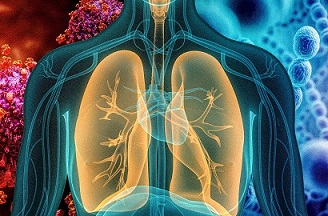BREAKING MEDICAL NEWS! AI Uncovers That Secondary Bacterial Infections And Not Cytokine Storms Were Driving COVID-19 Deaths!
Medical News - Secondary Bacterial Pneumonia Infections May 07, 2023 1 year, 11 months, 1 week, 6 days, 15 hours, 36 minutes ago
Medical News: A new shocking revelation has emerged that showed that for the last three and a half years, many so called ‘expert’s and physicians were treating COVID-19 wrongly and that many deaths were in fact attributed to COVID-19 patients developing secondary bacterial infections!

Researchers at Northwestern University Feinberg School of Medicine - USA have debunked the popular "cytokine storm" theory behind COVID-19 patient deaths and uncovered that unresolving secondary bacterial pneumonia is the primary cause of deaths in hospitalized COVID-19 patients. Using machine learning to analyze medical records, the scientists found that almost half of patients with COVID-19 requiring mechanical ventilation support developed secondary bacterial pneumonia.
Secondary bacterial infection of the lung (pneumonia) was found to be the key driver of death in patients with COVID-19, and in some cases, even exceeded death rates from the viral infection itself!
The study findings negates the previously believed cytokine storm theory, which argued that overwhelming inflammation led to organ failure and death.
Senior author Dr Benjamin Singer, MD, emphasized the importance of preventing, detecting, and aggressively treating secondary bacterial pneumonia in critically ill patients, including those with COVID-19. The researchers discovered that patients cured of their secondary pneumonia were more likely to survive, while those who did not resolve their pneumonia were more likely to die.
The study analyzed 585 patients in the intensive care unit (ICU) at Northwestern Memorial Hospital with severe pneumonia and respiratory failure, 190 of whom had COVID-19. The scientists developed a new machine learning approach called CarpeDiem, which groups similar ICU patient-days into clinical states based on electronic health record data. This innovative method allowed them to investigate how complications like bacterial pneumonia impacted the course of the illness.
Dr Catherine Gao, MD, study co-first author, highlighted the potential of machine learning and artificial intelligence in developing better treatments for diseases like COVID-19 and assisting ICU physicians managing these patients.
The study team found nearly half of patients with COVID-19 develop a secondary ventilator-associated bacterial pneumonia.
Dr Singer told Thailand
Medical News, “The term ‘cytokine storm’ means an overwhelming inflammation that drives organ failure in your lungs, your kidneys, your brain and other organs. If that were true, if cytokine storm were underlying the long length of stay we see in patients with COVID-19, we would expect to see frequent transitions to states that are characterized by multi-organ failure. That’s not what we saw.”
He further added, “Instead what we found was that more than half of these patients had secondary bacterial pneumonia especially secondary ventilator-associated bacterial pneumonia. Our research highlights the importance of preventing, looking for, and aggressively treating secondary bacterial pneumonia in critically ill patients with severe pneumonia, including those with COVID-19.&rdq
uo;
The study findings further revealed that the ICU course of patients with severe SARS-CoV-2 pneumonia is more than twice as long as those with pneumonia and respiratory failure due to other causes. Despite longer durations of critical illness, mortality rates in COVID-19 patients were similar to patients with other causes of pneumonia and respiratory failure. However, unresolving episodes of ventilator-associated pneumonia (VAP) were linked to increased mortality, particularly among patients with COVID-19.
Dr Singer stressed, “Those who were cured of their secondary pneumonia were likely to live, while those whose pneumonia did not resolve were more likely to die. Our study data suggested that the mortality related to the virus itself is relatively low, but other things that happen during the ICU stay, like secondary bacterial pneumonia, offset that.”
CarpeDiem's findings support emerging models of SARS-CoV-2 pneumonia pathobiology, suggesting severe SARS-CoV-2 pneumonia results from a slowly progressive but spatially localized pulmonary infection, leading to prolonged respiratory failure and higher rates of VAP. The research underscores the importance of improving strategies to diagnose and successfully treat VAP episodes, including pathogen-directed therapy guided by bronchoalveolar lavage (BAL) fluid analysis, to enhance ICU outcomes.
.jpg) Graphical Abstract
Graphical Abstract
The importance of VAP as a driver of mortality in patients with COVID-19 has been underestimated due to the underuse of bronchoscopic sampling during the pandemic, the universal use of antibiotics, and the lack of accurate clinical criteria and biomarkers to distinguish between primary SARS-CoV-2 pneumonia and secondary bacterial pneumonia.
Study co-author, Dr Richard Wunderink, MD, who leads the Successful Clinical Response in Pneumonia Therapy Systems Biology Center at Northwestern commented, “The importance of bacterial superinfection of the lung as a contributor to death in patients with COVID-19 has been underappreciated, because most centers have not looked for it or only look at outcomes in terms of presence or absence of bacterial superinfection, not whether treatment is successful or not.”
The next steps in the research include using molecular data from study samples and integrating it with machine learning approaches to understand why some patients recover from pneumonia and others do not. The investigators also plan to expand the technique to larger datasets and use the model to make predictions that can be brought back to the bedside to improve the care of critically ill patients.
The study showed that machine learning has identified unresolving ventilator-associated pneumonia as a major contributor to mortality in critically ill patients with pneumonia, including those due to SARS-CoV-2. This groundbreaking discovery challenges previous assumptions about COVID-19 patient deaths and highlights the urgent need to focus on the prevention, detection, and aggressive treatment of secondary bacterial pneumonia.
The study findings were published in the peer reviewed journal: The Journal of Clinical Investigation.
https://www.jci.org/articles/view/170682
For the latest Breaking
Medical News, keep on logging to Thailand Medical News.

.jpg)